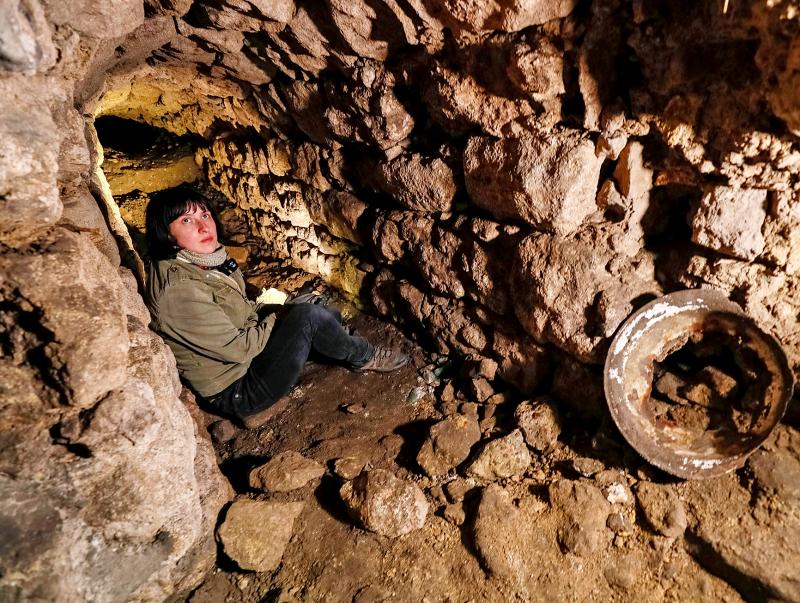Under cobblestone streets in the western Ukrainian city of Lviv, diggers have uncovered new hiding spots in underground sewers where some Jews managed to flee from Nazi occupation forces during World War II.
More than 100,000 Jews, or about one-third of the city’s population at the time, were killed by the Nazis, local historian Hanna Tychka said.
A few managed to survive, including father and daughter Ignacy and Krystyna Chiger, who escaped from the Jewish ghetto by digging a tunnel to the city’s sewage system, and later wrote books recounting their experiences.

Photo: Reuters
Tychka and local diggers said that they have uncovered the exact area where Chiger’s family lived in 1943 and 1944, using the books as a guide.
Chiger dug a 7m-long tunnel to the sewer from his ghetto barracks, breaking the sewer’s concrete wall, which was 90cm thick, Tychka said.
“They had to work quietly so that Nazis would not find out that digging activity was happening in the barrack basement. The Jews used a hammer wrapped in a duster,” Tychka told reporters near the site of the discovery.
Ukraine last month and this month is marking the 80th anniversary of the mass shooting of nearly 34,000 civilians at the wooded ravine of Babyn Yar in the capital, Kiev, one of the biggest single massacres of Jews during the Holocaust.
In July, Tychka and her team discovered a tiny cave in Lviv where they believe Jews fleeing the ghetto would spend their first night before moving on to a larger shelter in the sewage system.
In the larger shelter, the team found artefacts that they believe were used by the hiding families, including a corroded plate, the figurine of a sheep and traces of carbide used for lanterns. They also discovered pieces of glass placed in between bricks in the wall, which were used to prevent rats from stealing food.
On a visit to the site, Tychka also pointed out a pipe from where she believed the families could take drinking water.
Chiger’s family was part of a larger group that also included Halina Wind Preston, then in her early 20s.
Of the original group of 21, only 10 — including the Chigers and Halina — survived the ordeal, her son, David Lee Preston, said.
Several could not stand the conditions in the sewer for long and left, and the group faced the constant danger of being discovered.
A baby born to one of the women in the group, whose husband had been swept away by water while going out to get drinking water, had to be suffocated for fear that its crying would give away their location, Preston said.
Preston, who worked as a journalist for many years, wrote several articles for the Philadelphia Inquirer after his mother’s death, recounting her story as well as that of his father, a former prisoner in the Auschwitz and Buchenwald death camps.
Preston, who maintains a Web site about the family’s experiences and his reporting on the Holocaust, said that his mother and her group were helped throughout the time they lived in the sewer by two sewer workers.
They left their hiding place when Lviv was taken back by the Soviet Army in July 1944.
The film In Darkness, a dramatized account of the group’s survival by Polish filmmaker Agnieszka Holland, was nominated for Best Foreign Language Film at the 2012 Academy Awards.

Packed crowds in India celebrating their cricket team’s victory ended in a deadly stampede on Wednesday, with 11 mainly young fans crushed to death, the local state’s chief minister said. Joyous cricket fans had come out to celebrate and welcome home their heroes, Royal Challengers Bengaluru, after they beat Punjab Kings in a roller-coaster Indian Premier League (IPL) cricket final on Tuesday night. However, the euphoria of the vast crowds in the southern tech city of Bengaluru ended in disaster, with Indian Prime Minister Narendra calling it “absolutely heartrending.” Karnataka Chief Minister Siddaramaiah said most of the deceased are young, with 11 dead

By 2027, Denmark would relocate its foreign convicts to a prison in Kosovo under a 200-million-euro (US$228.6 million) agreement that has raised concerns among non-governmental organizations (NGOs) and residents, but which could serve as a model for the rest of the EU. The agreement, reached in 2022 and ratified by Kosovar lawmakers last year, provides for the reception of up to 300 foreign prisoners sentenced in Denmark. They must not have been convicted of terrorism or war crimes, or have a mental condition or terminal disease. Once their sentence is completed in Kosovan, they would be deported to their home country. In

Brazil, the world’s largest Roman Catholic country, saw its Catholic population decline further in 2022, while evangelical Christians and those with no religion continued to rise, census data released on Friday by the Brazilian Institute of Geography and Statistics (IBGE) showed. The census indicated that Brazil had 100.2 million Roman Catholics in 2022, accounting for 56.7 percent of the population, down from 65.1 percent or 105.4 million recorded in the 2010 census. Meanwhile, the share of evangelical Christians rose to 26.9 percent last year, up from 21.6 percent in 2010, adding 12 million followers to reach 47.4 million — the highest figure

LOST CONTACT: The mission carried payloads from Japan, the US and Taiwan’s National Central University, including a deep space radiation probe, ispace said Japanese company ispace said its uncrewed moon lander likely crashed onto the moon’s surface during its lunar touchdown attempt yesterday, marking another failure two years after its unsuccessful inaugural mission. Tokyo-based ispace had hoped to join US firms Intuitive Machines and Firefly Aerospace as companies that have accomplished commercial landings amid a global race for the moon, which includes state-run missions from China and India. A successful mission would have made ispace the first company outside the US to achieve a moon landing. Resilience, ispace’s second lunar lander, could not decelerate fast enough as it approached the moon, and the company has